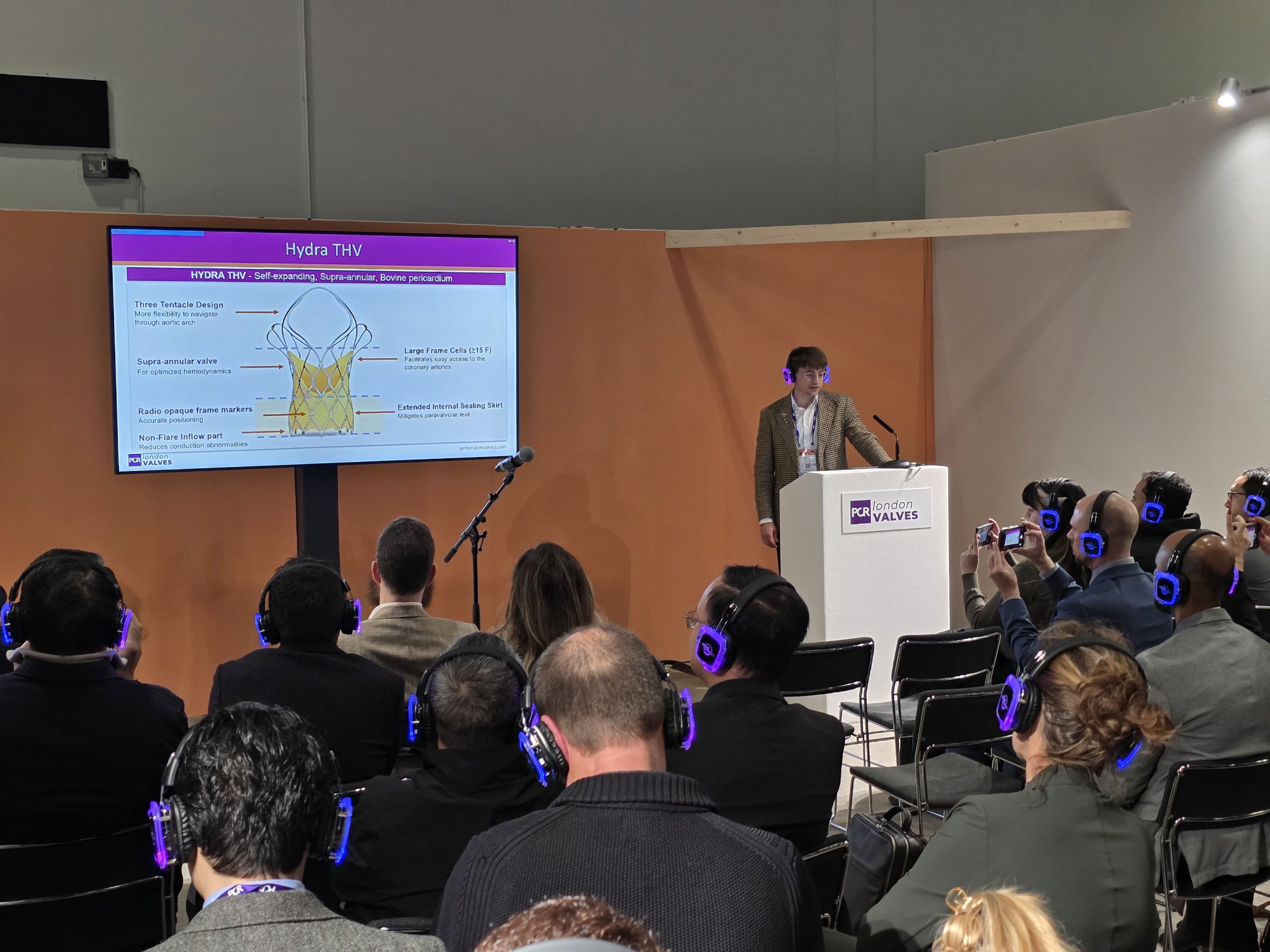SMT’s Hydra TAVR Valve Demonstrates Sustained Safety, Durability, and Hemodynamic Performance at 5 Years
Sahajanand Medical Technologies’ (SMT)
Sahajanand Medical Technologies’ (SMT) TAVR product Hydra’s 5-year follow-up results from the pivotal Hydra CE Study were presented by Dr. Vilhelmas Bajoras at PCR London Valves 2025. The long-term data reaffirm Hydra’s durable valve performance, sustained hemodynamic improvement, and favourable safety profile in patients with severe aortic stenosis.
The Hydra CE Study, led by Prof. Audrius Aidietis (Vilnius University Hospital Santaros Clinics, Lithuania) and Prof. Adam Witkowski (National Institute of Cardiology, Warsaw, Poland), was a prospective, multicenter clinical trial that enrolled 157 patients across Europe. Of these, 54 patients from Lithuania and Poland were followed for up to 5 years, providing valuable long-term evidence on valve durability and clinical outcomes.
At 5 years, Hydra demonstrated high overall survival, low rates of disabling stroke, and durable valve performance with stable gradients and effective orifice area. Importantly, the data confirms favorable valve durability with no cases of structural valve deterioration requiring reintervention, underscoring Hydra’s consistent long-term performance.
The primary endpoint of the long-term cohort was all-cause mortality at 5 years.
Secondary endpoints included cardiovascular mortality, stroke, permanent pacemaker implantation, paravalvular leak, hemodynamic performance (mean gradient and effective orifice area), NYHA functional class improvement, and the absence of structural valve deterioration, endocarditis, or thrombosis.
The all-cause mortality was 24.3%, with cardiovascular mortality of 6.0%. The stroke rate was 12.2%, including two disabling and four non-disabling strokes or transient ischemic attacks. Permanent pacemaker implantation occurred in 16.7% of patients, and notably, no moderate or severe paravalvular leak was observed, at 5 years.
Hydra demonstrated sustained valve function, with effective orifice area increasing from 0.68 ± 0.15 cm² at baseline to 2.09 ± 0.57 cm² (p < 0.001) and mean transvalvular gradient decreasing from 53.4 ± 14.24 mmHg to 8.0 ± 3.14 mmHg (p < 0.001).
In addition, 65% of patients showed an improvement of at least one NYHA class, reflecting sustained symptomatic relief. Importantly, no valve endocarditis, thrombosis, or structural valve deterioration was reported through 5 years.
Commenting on the study results, Prof. Audrius Aidietis, Principal Investigator of the Hydra CE Study, Senior Consultant at Cardiology and Angiology Centre and Cardiac Surgery Centre of Vilnius University Hospital Santaros Clinics, Lithuania said, “The 5-year results highlight Hydra Valve’s sustained safety, durability and consistent clinical performance. We observed durable valve function, survival and stable hemodynamics through 5 years. These findings underscore the long-term reliability of Hydra in treating patients with severe aortic stenosis.”
Dr. Vilhelmas Bajoras, Co-Investigator of the Hydra CE Study, Clinic of Cardiac and Vascular Diseases, Institute of Clinical Medicine, Faculty of Medicine, Vilnius University, Vilnius, Lithuania added, “The absence of structural valve deterioration or significant paravalvular leak at 5 years is an achievement. Hydra continues to demonstrate that self-expanding TAVR technology can deliver durable outcomes and sustained clinical benefits over the long term.”
Dr. Krishna Sudhir, Chief Medical Officer at Sahajanand Medical Technologies (SMT), added “These consistent 5-year outcomes of Hydra showing excellent survival, sustained valve function, and stable hemodynamics, reaffirm our commitment to advancing cardiovascular care through engineering and evidence-based medicine. The valve’s enduring performance underscores our commitment to delivering reliable, safe, and durable TAVR solutions that advance patient outcomes across the globe.”
The 5-year Hydra CE results stand as a testament to SMT’s unwavering commitment to advancing quality-driven, research-based cardiovascular care. Guided by clinical and evidence-based medicine, SMT strives to deliver transformative solutions that address evolving patient needs worldwide. With quality at its heart, the company remains dedicated to its mission of saving millions of lives and improving long-term health outcomes globally.
Got a story that Healthcare Executive should dig into? Shoot it over to arunima.rajan@hosmac.com—no PR fluff, just solid leads.

